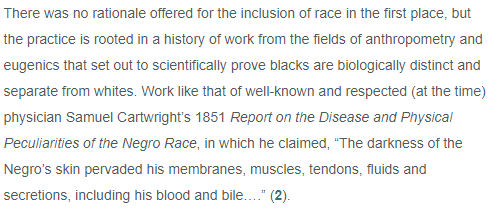Why does every BMP report show a GFR - African American and GFR - non-African American for the same Cr value?
Let's focus on #racecorrection in the estimation of GFR as part of our ongoing series on racial bias in medicine.
This #tweetorial is based on the work of Dr. Vanessa Grubs (@thenephrologist), Dr. Darshali Vyas (@DarshaliVyas), Dr. Nwamaka Eneanya (@AmakaEMD), Dorothy Roberts (@DorothyERoberts), and so many more. We encourage you to delve into the literature at the bottom.
MDRD (bit.ly/3euUMYg) and CKD-EPI (bit.ly/3ez1Cfb), 2 equations commonly used to estimate kidney function, make sizable adjustments to the estimated GFR (eGFR) based on a binary input term: black or non-black race.
On May 29, @UWMedicine elected to remove race from their calculations and report a single eGFR for all patients after med students from their Anti-Racism Action Committee questioned the evidence behind race correction. Let’s take a closer look
bit.ly/3ezO9Uj
Since measuring GFR directly is expensive and difficult, it’s usually estimated using indirect serum components cleared by the kidney (think: creatinine). This requires population-based studies to fit estimated GFR to a set of input variables, often age, sex, and race.
Race was introduced in ‘99 after the MDRD study evaluated 1,628 patients with CKD and found that those who self-identified as black (12%) had higher serum Cr at the same GFR than whites (Levey 1999). A 1.21 race correction for black race was based on regression models
You may recognize Cartwright from our previous tweetorial on racial bias in modern day pulmonary function testing.
The MDRD study claimed that muscle mass differences supported the need for race correction, though the evidence was flimsy from the start (Crohn 1977, James 1988). CKD-Epi, developed in 2009, applies a race correction factor of 1.16 based on their own regression models
Supporters of race correction point to evidence that eliminating race correction in CKD-Epi underestimates eGFR in black patients (Levey 2020). They argue that underestimating GFR may prompt underdosing of meds or prevent the use of meds that require eGFR thresholds
Opponents argue that race correction can overestimate GFR in black patients. Evidence suggests that race correction leads to delay in ESRD diagnosis (Babayev 2012), overestimation of GFR in lean black patients (Eastwood 2010) and under-recognition of CKD (Peralta 2010).
The classification of patients into binary “non-black” and “black” is problematic in a medical system that serves all races and where knowledge of genomics is rapidly expanding.
It perpetuates a longstanding American practice of categorizing those with only European ancestry as white, and anyone with any level of African ancestry as black.
What are the alternatives? A study of 9,000 diverse NYC patients used genome-wide genotyping data to estimate African ancestry. Reclassifying eGFR by ancestry changed CKD staging in up to 4% of participants to stages more consistent with serum electrolytes. (Udler 2015)
Other alternatives include use of other serum markers of kidney function like Cystatin-C alone (as advocated by Dr. Grubbs) or in combination with creatinine to estimate GFR
Or, if working with creatinine values, make sure to disclose to patients the use of race in current eGFR calculations and engage in shared decision-making over lab results. (Levey 2020).
We need to learn more about WHY race correction improves eGFR on a population level. Until then we are at risk of perpetuating bias and mistaking a social construct (race) for underlying biology
#RacismIsAPublicHealthCrisis #RaceCorrection #eGFR #Nephrology
Estimating eGFR
Cockroft and Gault: pubmed.ncbi.nlm.nih.gov/1244564/
MDRD: pubmed.ncbi.nlm.nih.gov/10075613/
CKD Epi: pubmed.ncbi.nlm.nih.gov/19414839/
MDRD Updated Correction: pubmed.ncbi.nlm.nih.gov/16908915/
cjasn.asnjournals.org/content/3/4/99…
journals.physiology.org/doi/abs/10.115…
academic.oup.com/rheumatology/a…
journals.physiology.org/doi/abs/10.115…
pubmed.ncbi.nlm.nih.gov/32393465/
pubmed.ncbi.nlm.nih.gov/31169890/
jasn.asnjournals.org/content/26/7/1…
pubmed.ncbi.nlm.nih.gov/23260275/
pubmed.ncbi.nlm.nih.gov/20100724/
pubmed.ncbi.nlm.nih.gov/20519233/
pubmed.ncbi.nlm.nih.gov/25349204/
pubmed.ncbi.nlm.nih.gov/22762315/



